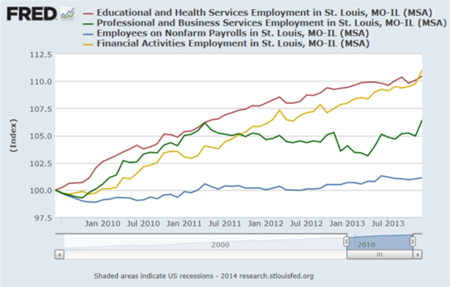Ask an Economist
Kevin L. Kliesen is a business economist and Research officer at the Federal Reserve Bank of St. Louis. His main areas of interest are monetary and fiscal policy and macroeconomic forecasting. Kliesen co-developed the St. Louis Fed's Financial Stress Index with a former colleague. He initially went to college to be a farmer, but then fell in love with economics. Every spring and summer, he returns to his roots to try to make his plants and flowers thrive in the St. Louis summer. For more on Kliesen's work, see http://research.stlouisfed.org/econ/kliesen.
Q. As the city of St. Louis turns 250, how well is it positioned in terms of employment growth? What are some of the opportunities out there for the area?
A. St. Louis is a service-based economy, much like the U.S. is as a whole. In the St. Louis metro area, the sectors with the largest growth rates are the education and health care sector, the professional and business services sector, and the financial activities sector.
Over the longer term, St. Louis is fairly well-positioned in terms of employment growth, given the area's concentration in health care, technology and financial services. The Bureau of Labor Statistics recently published employment projections for the next 10 years. The top two occupations when it comes to job growth are health-care related. Due to the aging of the baby boomers, there is more demand for health-care services. Also, as people get older and accumulate wealth, demand for financial services typically increases.
Employment in manufacturing has been relatively flat recently. Many people believe that manufacturing has large spillovers to the local economy. However, recent research by Enrico Moretti, an economist at the University of California at Berkeley, shows that jobs in the innovation sector—such as computer companies and biotechnology firms—have a much higher multiplier effect.[1] Using data on 9 million workers in 320 U.S. metropolitan areas, Moretti found that the multiplier effect for the innovation sector is about three times as large as that of extractive industries and traditional manufacturing. In other words, the most important effect of high-tech companies on local economies is outside high tech. Additionally, because innovation jobs are typically higher paying, the service jobs that are created as spillovers pay more, too. St. Louis would benefit from more growth in this area. In this vein, recent entrepreneurial efforts in St. Louis at the so-called T-Rex new-firm incubator are promising.[2]
Views expressed in Regional Economist are not necessarily those of the St. Louis Fed or Federal Reserve System.
For the latest insights from our economists and other St. Louis Fed experts, visit On the Economy and subscribe.
Email Us



